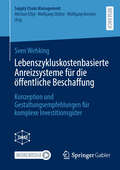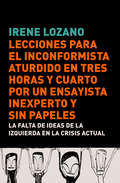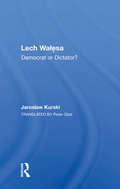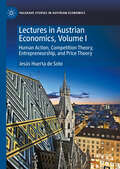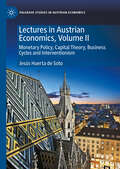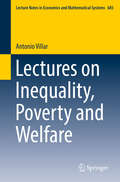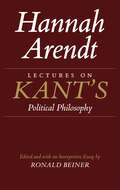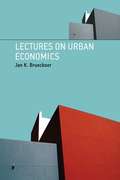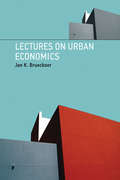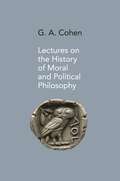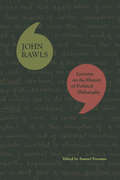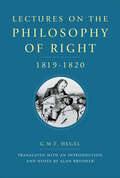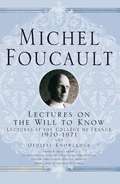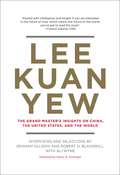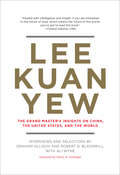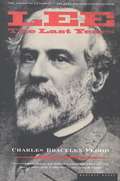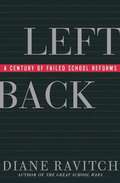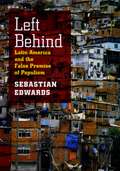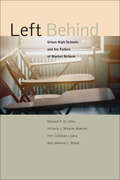- Table View
- List View
Lebenszykluskostenbasierte Anreizsysteme für die öffentliche Beschaffung: Konzeption und Gestaltungsempfehlungen für komplexe Investitionsgüter (Supply Chain Management)
by Sven WehkingDie öffentliche Beschaffung umfasst allein in Deutschland rund 350 Mrd. € mit steigender Tendenz. Grund genug, sich mit innovativen Konzepten zu beschäftigen, um die öffentliche Beschaffung möglichst effizient und effektiv zu gestalten. Lebenszykluskosten und Lebenszykluskostenmanagement sind bereits seit langer Zeit Gegenstand der wissenschaftlichen Forschung. Mit der Novellierung des öffentlichen Vergaberechts im Jahr 2016 werden Lebenszykluskosten erstmals explizit als Zuschlagskriterium genannt, womit dem Anspruch an eine ökonomische Nachhaltigkeit der öffentlichen Beschaffung Rechnung getragen wird. Aufgrund von Fehlanreizen für Auftragnehmer bedarf es jedoch Anreizsysteme, um die kontrahierten Lebenszykluskosten auch einzuhalten. Darauf aufbauend soll mit dem in diesem Buch vorgelegten Konzept ein Versuch unternommen werden, diese Herausforderung anzugehen.
Lecciones para el inconformista aturdido en tres horas y cuarto, por un ensayista inexperto y sin papeles
by Irene LozanoEn medio de una profunda crisis económica, provocada por los excesos del capitalismo, sería de esperar un auge de la izquierda. Pero los partidos laboristas, socialistas y socialdemócratas se desangran en toda Europa. Parece haber cada vez menos izquierda, pero ¿qué ocurre con los izquierdistas? ¿Se han convertido en unos sin techo de las ideas de progreso, desquiciados por las incongruencias de la izquierda oficial? Irene Lozano recorre las causas de su aturdimiento desde la caída del Muro de Berlín, para esbozar lo que a su juicio deberían ser las "ideas-fuerza" de la izquierda hoy. Con originalidad, la autora aborda el declive del papel del intelectual en la discusión pública, en un ensayo que hará pensar y disfrutar a los lectores. Sólo han de cumplir un requisito: estar dispuestos a dejarse sorprender durante tres horas y cuarto.
Lech Walesa: Democrat Or Dictator?
by Jaroslaw KurskiDrawing on his unique insider's perspective as press spokesman for Lech Walesa from October 1989 to July 1990, Jaroslaw Kurski has written the first critical, clear-eyed account of the Polish leader's personal and political style. During his time in Walesa's office, Kurski became acquainted with the many forces and ambitions-which were unknown to t
Lectures in Austrian Economics, Volume I: Human Action, Competition Theory, Entrepreneurship, and Price Theory (Palgrave Studies in Austrian Economics)
by Jesús Huerta de SotoThis book, the first of two volumes, comes to life through the transcription of captivating classroom lectures spanning several years, providing a comprehensive overview of the core topics within Austrian economics. With a focus on microeconomics, it explores foundational ideas within Austrian economics, including human action, entrepreneurship, competition theory, and price theory, to give readers a deep understanding of each topic unravelling complex economic concepts with clarity and precision. Economic uncertainty, rationality, marginal utility, productivity, exchange interactions, valuation, price determination, and monopoly are also discussed. Through a seamless blend of theory and real-world examples, readers are invited to challenge conventional wisdom and explore the implications of Austrian economics on society and individual freedom. This book offers an accessible and engaging synthesis of Austrian economics that redefines the topic within modern economics. It will be relevant to students, teachers, and scholars of many other academic institutions around the world, interested in the approach of the Austrian School of economics and its relevance in today’s ever-evolving world.
Lectures in Austrian Economics, Volume II: Monetary Policy, Capital Theory, Business Cycles and Interventionism (Palgrave Studies in Austrian Economics)
by Jesús Huerta de SotoThis book, the second of two volumes, provides a comprehensive overview of the core topics within Austrian economics. With a focus on macroeconomics, it explores foundational ideas within Austrian economics, including monetary and banking theory, law, capital theory, business cycles, the relationship between the market and the state, and interventionism. These ideas are contextualized within the history of economic thought, in particular the work of Ludwig von Mises. The Keynesian system, reform to the banking system, wages, social order, fiscal policy, and the political economy of ethics are also discussed. This book offers an accessible and engaging synthesis of Austrian economics that redefines the topic within modern economics. It will be relevant to students and researchers interested in Austrian economics and the political economy.
Lectures on Inequality, Poverty and Welfare
by Antonio VillarThese lectures aim to help readers understand the logics and nature of the main indicators of inequality and poverty, with special attention to their social welfare underpinnings. The key approach consists in linking inequality and poverty measurement with welfare evaluation. As concern for inequality and poverty stems from ethical considerations, the measurement of those aspects necessarily involves some value judgments. Those value judgments can be linked, directly or indirectly, to welfare assessments on the distribution of personal and social opportunities. Inequality and poverty are thus considered to be partial aspects of the welfare evaluation of the opportunities in a given society. The volume includes two applications that illustrate how the models can be implemented. They refer to inequality of opportunity and poverty in education, using PISA data.
Lectures on Kant's Political Philosophy
by Hannah ArendtHannah Arendt's last philosophical work was an intended three-part project entitled The Life of the Mind. Unfortunately, Arendt lived to complete only the first two parts, Thinking and Willing. Of the third, Judging, only the title page, with epigraphs from Cato and Goethe, was found after her death. As the titles suggest, Arendt conceived of her work as roughly parallel to the three Critiques of Immanuel Kant. In fact, while she began work on The Life of the Mind, Arendt lectured on "Kant's Political Philosophy," using the Critique of Judgment as her main text. The present volume brings Arendt's notes for these lectures together with other of her texts on the topic of judging and provides important clues to the likely direction of Arendt's thinking in this area.
Lectures on Religion
by Stephen J. Fleming John W. WelchLectures discussing the role religion played in the founding of America and its continued role up until the early 20th century
Lectures on Urban Economics
by Brueckner Jan K.Lectures on Urban Economics offers a rigorous but nontechnical treatment of major topics in urban economics. To make the book accessible to a broad range of readers, the analysis is diagrammatic rather than mathematical. Although nontechnical, the book relies on rigorous economic reasoning. In contrast to the cursory theoretical development often found in other textbooks, Lectures on Urban Economics offers thorough and exhaustive treatments of models relevant to each topic, with the goal of revealing the logic of economic reasoning while also teaching urban economics. Topics covered include reasons for the existence of cities, urban spatial structure, urban sprawl and land-use controls, freeway congestion, housing demand and tenure choice, housing policies, local public goods and services, pollution, crime, and quality of life. Footnotes throughout the book point to relevant exercises, which appear at the back of the book. These 22 extended exercises (containing 125 individual parts) develop numerical examples based on the models analyzed in the chapters. Lectures on Urban Economics is suitable for undergraduate use, as background reading for graduate students, or as a professional reference for economists and scholars interested in the urban economics perspective.
Lectures on Urban Economics
by Jan K. BruecknerA rigorous but nontechnical treatment of major topics in urban economics. Lectures on Urban Economics offers a rigorous but nontechnical treatment of major topics in urban economics. To make the book accessible to a broad range of readers, the analysis is diagrammatic rather than mathematical. Although nontechnical, the book relies on rigorous economic reasoning. In contrast to the cursory theoretical development often found in other textbooks, Lectures on Urban Economics offers thorough and exhaustive treatments of models relevant to each topic, with the goal of revealing the logic of economic reasoning while also teaching urban economics. Topics covered include reasons for the existence of cities, urban spatial structure, urban sprawl and land-use controls, freeway congestion, housing demand and tenure choice, housing policies, local public goods and services, pollution, crime, and quality of life. Footnotes throughout the book point to relevant exercises, which appear at the back of the book. These 22 extended exercises (containing 125 individual parts) develop numerical examples based on the models analyzed in the chapters. Lectures on Urban Economics is suitable for undergraduate use, as background reading for graduate students, or as a professional reference for economists and scholars interested in the urban economics perspective.
Lectures on the History of Moral and Political Philosophy
by Jonathan Wolff G. A. CohenPreviously unpublished writings from one of the most important political philosophers of recent timesG. A. Cohen was one of the leading political philosophers of recent times. He first came to wide attention in 1978 with the prize-winning book Karl Marx's Theory of History: A Defence. In subsequent decades his published writings largely turned away from the history of philosophy, focusing instead on equality, freedom, and justice. However, throughout his career he regularly lectured on a wide range of moral and political philosophers of the past. This volume collects these previously unpublished lectures.Starting with a chapter centered on Plato, but also discussing the pre-Socratics as well as Aristotle, the book moves to social contract theory as discussed by Hobbes, Locke, and Hume, and then continues with chapters on Kant, Hegel, and Nietzsche. The book also contains some previously published but uncollected papers on Marx, Hobbes, and Kant, among other figures. The collection concludes with a memoir of Cohen written by the volume editor, Jonathan Wolff, who was a student of Cohen's.A hallmark of the lectures is Cohen's engagement with the thinkers he discusses. Rather than simply trying to render their thought accessible to the modern reader, he tests whether their arguments and positions are clear, sound, and free from contradiction. Throughout, he homes in on central issues and provides fresh approaches to the philosophers he examines. Ultimately, these lectures teach us not only about some of the great thinkers in the history of moral and political philosophy, but also about one of the great thinkers of our time: Cohen himself.
Lectures on the History of Political Philosophy
by John Rawls Samuel FreemanThis last book by the late John Rawls, derived from written lectures and notes for his long-running course on modern political philosophy, offers readers an account of the liberal political tradition from a scholar viewed by many as the greatest contemporary exponent of the philosophy behind that tradition. <p><p> Rawls's goal in the lectures was, he wrote, "to identify the more central features of liberalism as expressing a political conception of justice when liberalism is viewed from within the tradition of democratic constitutionalism." He does this by looking at several strands that make up the liberal and democratic constitutional traditions, and at the historical figures who best represent these strands--among them the contractarians Hobbes, Locke, and Rousseau; the utilitarians Hume, Sidgwick, and J. S. Mill; and Marx regarded as a critic of liberalism. Rawls's lectures on Bishop Joseph Butler also are included in an appendix. Constantly revised and refined over three decades, Rawls's lectures on these figures reflect his developing and changing views on the history of liberalism and democracy--as well as how he saw his own work in relation to those traditions. <p> With its clear and careful analyses of the doctrine of the social contract, utilitarianism, and socialism--and of their most influential proponents--this volume has a critical place in the traditions it expounds. Marked by Rawls's characteristic patience and curiosity, and scrupulously edited by his student and teaching assistant, Samuel Freeman, these lectures are a fitting final addition to his oeuvre, and to the history of political philosophy as well.
Lectures on the History of Political Philosophy
by John RawlsThis last book by the late John Rawls, derived from written lectures and notes for his long-running course on modern political philosophy, offers readers an account of the liberal political tradition from a scholar viewed by many as the greatest contemporary exponent of the philosophy behind that tradition. Rawls’s goal in the lectures was, he wrote, “to identify the more central features of liberalism as expressing a political conception of justice when liberalism is viewed from within the tradition of democratic constitutionalism.” He does this by looking at several strands that make up the liberal and democratic constitutional traditions, and at the historical figures who best represent these strands—among them the contractarians Hobbes, Locke, and Rousseau; the utilitarians Hume, Sidgwick, and J. S. Mill; and Marx regarded as a critic of liberalism. Rawls’s lectures on Bishop Joseph Butler also are included in an appendix. Constantly revised and refined over three decades, Rawls’s lectures on these figures reflect his developing and changing views on the history of liberalism and democracy—as well as how he saw his own work in relation to those traditions. With its clear and careful analyses of the doctrine of the social contract, utilitarianism, and socialism—and of their most influential proponents—this volume has a critical place in the traditions it expounds. Marked by Rawls’s characteristic patience and curiosity, and scrupulously edited by his student and teaching assistant, Samuel Freeman, these lectures are a fitting final addition to his oeuvre, and to the history of political philosophy as well.
Lectures on the Philosophy of Right, 1819–1820
by G.W.F. HegelPublished in 1821, Outlines of the Philosophy of Right is considered the definitive articulation of the legal, moral, social, and political philosophy of G.W.F. Hegel. However, shortly before its publication, Hegel delivered a series of lectures on the subject matter of the work at the University of Berlin. These lectures are unlike any others Hegel gave on the philosophy of Right in that they do not supplement a published text but rather give a full and independent presentation of his mature political thought. Yet, they are also unlike Hegel’s formal treatise in that they form a smooth and flowing discourse, much like Hegel’s lectures on the philosophy of history, philosophy of art, philosophy of religion, and history of philosophy. Substantively, these lectures contain more extensive discussions of poverty and the proletariat than are found in Hegel’s published text – discussions that carry out the retreat from optimism about the present age intimated in the preface to Outlines but nowhere evident in the text itself. Translated with an introduction and notes by Alan Brudner, Hegel’s 1819/20 lectures on the philosophy of Right present his complete thoughts on law and the state in a manner that is more accessible and engaging than any other Hegelian text on these subjects.
Lectures on the Will to Know: Lectures at the College De France 1970–1971 and Oedipal Knowledge
by Daniel DefertLectures on the Will to Know reminds us that Michel Foucault's work only ever had one object: truth. Here, he builds on his earlier work, Discipline and Punish, to explore the relationship between tragedy, conflict, and truth-telling. He also explores the different forms of truth-telling, and their relation to power and the law. The publication of Lectures on the Will to Know marks a milestone in Foucault's reception, and it will no longer be possible to read him in the same way as before.
Led by Donkeys: How Four Friends with a Ladder Took on Brexit
by Led By DonkeysThe official account - complete with full-color illustrations - of how four ordinary people managed to expose the British government's hypocrisies through a nationwide guerrilla advertising campaign. Seeking to highlight the hypocrisy of their politicians on Brexit four friends armed with nothing more than ladders, roller brushes and a treasure trove of damning statements from their leaders slapped up the politicians' biggest lies on billboards around the country. This guerrilla operation wasn't easy, but it wasn't long before the British public enabled them to take things into their own hands - and the rest is history. Leave the EU or remain? An apparently simple question divided the nation in historic fashion. Many believed the words of these politicians. By putting up their quotes as billboards, self-styled 'Led By Donkeys' had clear intentions - to compare the promises that have been made across the years with the damning reality.
Ledger: Poems
by Jane HirshfieldA pivotal book of personal, ecological, and political reckoning from the internationally renowned poet named "among the modern masters" (The Washington Post).Ledger's pages hold the most important and masterly work yet by Jane Hirshfield, one of our most celebrated contemporary poets. From the already much-quoted opening lines of despair and defiance ("Let them not say: we did not see it. / We saw"), Hirshfield's poems inscribe a registry, both personal and communal, of our present-day predicaments. They call us to deepened dimensions of thought, feeling, and action. They summon our responsibility to sustain one another and the earth while pondering, acutely and tenderly, the crises of refugees, justice, and climate. They consider "the minimum mass for a whale, for a language, an ice cap," recognize the intimacies of connection, and meditate upon doubt and contentment, a library book with previously dog-eared corners, the hunger for surprise, and the debt we owe this world's continuing beauty. Hirshfield's signature alloy of fact and imagination, clarity and mystery, inquiry, observation, and embodied emotion has created a book of indispensable poems, tuned toward issues of consequence to all who share this world's current and future fate.
Lee Kuan Yew
by Robert D. Blackwill Graham AllisonWhen Lee Kuan Yew speaks, presidents, prime ministers, diplomats, and CEOs listen. Lee, the founding father of modern Singapore and its prime minister from 1959 to 1990, has honed his wisdom during more than fifty years on the world stage. Almost single-handedly responsible for transforming Singapore into a Western-style economic success, he offers a unique perspective on the geopolitics of East and West. American presidents from Richard Nixon to Barack Obama have welcomed him to the White House; British prime ministers from Margaret Thatcher to Tony Blair have recognized his wisdom; and business leaders from Rupert Murdoch to Rex Tillerson, CEO of Exxon Mobil, have praised his accomplishments. This book gathers key insights from interviews, speeches, and Lee's voluminous published writings and presents them in an engaging question and answer format. Lee offers his assessment of China's future, asserting, among other things, that "China will want to share this century as co-equals with the U.S." He affirms the United States' position as the world's sole superpower but expresses dismay at the vagaries of its political system. He offers strategic advice for dealing with China and goes on to discuss India's future, Islamic terrorism, economic growth, geopolitics and globalization, and democracy. Lee does not pull his punches, offering his unvarnished opinions on multiculturalism, the welfare state, education, and the free market. This little book belongs on the reading list of every world leader -- including the one who takes the oath of office on January 20, 2013.
Lee Kuan Yew: The Grand Master's Insights on China, the United States, and the World (Belfer Center Studies in International Security)
by Robert D. Blackwill Graham Allison Ali WyneGrand strategist and founder of modern Singapore offers key insights and controversial opinions on globalization, geopolitics, economic growth, and democracy. When Lee Kuan Yew speaks, presidents, prime ministers, diplomats, and CEOs listen. Lee, the founding father of modern Singapore and its prime minister from 1959 to 1990, has honed his wisdom during more than fifty years on the world stage. Almost single-handedly responsible for transforming Singapore into a Western-style economic success, he offers a unique perspective on the geopolitics of East and West. American presidents from Richard Nixon to Barack Obama have welcomed him to the White House; British prime ministers from Margaret Thatcher to Tony Blair have recognized his wisdom; and business leaders from Rupert Murdoch to Rex Tillerson, CEO of Exxon Mobil, have praised his accomplishments. This book gathers key insights from interviews, speeches, and Lee's voluminous published writings and presents them in an engaging question and answer format. Lee offers his assessment of China's future, asserting, among other things, that “China will want to share this century as co-equals with the U.S.” He affirms the United States' position as the world's sole superpower but expresses dismay at the vagaries of its political system. He offers strategic advice for dealing with China and goes on to discuss India's future, Islamic terrorism, economic growth, geopolitics and globalization, and democracy. Lee does not pull his punches, offering his unvarnished opinions on multiculturalism, the welfare state, education, and the free market. This little book belongs on the reading list of every world leader—including the one who takes the oath of office on January 20, 2013.
Lee: The Last Years
by Charles Bracelen FloodA New York Times bestselling author&’s revealing account of General Robert E. Lee&’s life after Appomattox: &“An American classic" (Atlanta Journal-Constitution). After his surrender at Appomattox in 1865, Robert E. Lee, commanding general for the Confederate Army of Northern Virginia during the Civil War, lived only five more years. It was the great forgotten chapter of his remarkable life, during which Lee did more to bridge the divide between the North and the South than any other American. The South may have lost, but Lee taught them how to triumph in peace, and showed the entire country how to heal the wounds of war. Based on previously unseen documents, letters, family papers and exhaustive research into Lee&’s complex private life and public crusades, this is a portrait of a true icon of Reconstruction and quiet rebellion. From Lee&’s urging of Rebel soldiers to restore their citizenship, to his taking communion with a freedman, to his bold dance with a Yankee belle at a Southern ball, to his outspoken regret of his soldierly past, to withstanding charges of treason, Lee embodied his adage: &“True patriotism sometimes requires of men to act exactly contrary, at one period, to that which it does at another.&” Lee: The Last Years sheds a vital new light on war, politics, hero-worship, human rights, and Robert E. Lee&’s &“desire to do right.&”
Left Back: A Century of Failed School Reforms
by Diane RavitchFor the past one hundred years, Americans have argued and worried about the quality of their schools. Some have charged that students were not learning enough, while others have complained that the schools were not in the forefront of social progress. In this authoritative history of education in the twentieth century, historian Diane Ravitch describes this ongoing battle of ideas and explains why school reform has so often failed. "Left Back" recounts grandiose efforts by education reformers to use the schools to promote social and political goals, even when they diminished the schools' ability to educate children. It shows how generations of reformers have engaged in social engineering, advocating such innovations as industrial education, intelligence testing, curricular differentiation, and life-adjustment education. These reformers, she demonstrates, simultaneously mounted vigorous campaigns against academic studies. "Left Back" charges that American schools have been damaged by three misconceptions. The first is the belief that the schools can solve any social or political problem. The second is the belief that only a po
Left Behind: Latin America and the False Promise of Populism
by Sebastian EdwardsThe political and economic history of Latin America has been marked by great hopes and even greater disappointments. Despite abundant resources--and a history of productivity and wealth--in recent decades the region has fallen further and further behind developed nations, surpassed even by other developing economies in Southeast Asia and elsewhere. In Left Behind, Sebastian Edwards explains why the nations of Latin America have failed to share in the fruits of globalization and forcefully highlights the dangers of the recent turn to economic populism in the region. He begins by detailing the many ways Latin American governments have stifled economic development over the years through excessive regulation, currency manipulation, and thoroughgoing corruption. He then turns to the neoliberal reforms of the early 1990s, which called for the elimination of deficits, lowering of trade barriers, and privatization of inefficient public enterprises--and which, Edwards argues, held the promise of freeing Latin America from the burdens of the past. Flawed implementation, however, meant the promised gains of globalization were never felt by the mass of citizens, and growing frustration with stalled progress has led to a resurgence of populism throughout the region, exemplified by the economic policies of Venezuela's Hugo Chávez. But such measures, Edwards warns, are a recipe for disaster; instead, he argues, the way forward for Latin America lies in further market reforms, more honestly pursued and fairly implemented. As an example of the promise of that approach, Edwards points to Latin America's giant, Brazil, which under the successful administration of President Luis Inácio da Silva (Lula) has finally begun to show signs of reaching its true economic potential. As the global financial crisis has reminded us, the risks posed by failing economies extend far beyond their national borders. Putting Latin America back on a path toward sustained growth is crucial not just for the region but for the world, and Left Behind offers a clear, concise blueprint for the way forward.
Left Behind: The Democrats' Failed Attempt to Solve Inequality
by Lily GeismerThe 40-year history of how Democrats chose political opportunity over addressing inequality—and how the poor have paid the priceFor decades, the Republican Party has been known as the party of the rich: arguing for &“business-friendly&” policies like deregulation and tax cuts. But this incisive political history shows that the current inequality crisis was also enabled by a Democratic Party that catered to the affluent.The result is one of the great missed opportunities in political history: a moment when we had the chance to change the lives of future generations and were too short-sighted to take it.Historian Lily Geismer recounts how the Clinton-era Democratic Party sought to curb poverty through economic growth and individual responsibility rather than asking the rich to make any sacrifices. Fueled by an ethos of &“doing well by doing good,&” microfinance, charter schools, and privately funded housing developments grew trendy. Though politically expedient and sometimes profitable in the short term, these programs fundamentally weakened the safety net for the poor.This piercingly intelligent book shows how bygone policy decisions have left us with skyrocketing income inequality and poverty in America and widened fractures within the Democratic Party that persist to this day.
Left Behind: Urban High Schools and the Failure of Market Reform
by Edward P. St. John Victoria J. Milazzo Bigelow Kim Callahan Lijana Johanna C. MasséUrban schools are falling short of preparing students for college.In Left Behind, a team of education scholars led by Edward P. St. John argues that American cities have been engaged for the past three decades in a radical—but failing—effort to transform general and vocational high schools into college preparatory institutions. By examining the educational reforms in four urban charter schools across the United States and four public high schools in New York City, Left Behind reveals how educators contend with the challenge of developing new courses while providing social support for students to build college-going cultures.The research shows that district schools struggle to comply with standards that leave little room to develop advanced thematic curricula and that charter schools have not succeeded in substantially raising student test scores. Many students who start in rigorous charter schools transfer back to public schools while both public and charter schools struggle to prepare their students for college-level work.Left Behind provides crucial insights into the troubling trajectory of public policy while offering teachers and administrators effective strategies for overcoming barriers.
Left Elsewhere: Finding the Future in Radical Rural America (Boston Review)
by Elizabeth CatteAn examination of the emerging rural left, from environmentalists blocking pipeline construction to teachers on strike. In Left Elsewhere, volume editor and lead essayist Elizabeth Catte turns a skeptical eye toward “purple” politicians, such as West Virginia Democrat Richard Ojeda, who are hailed by many as the best hope for U.S. progressives outside the urban coasts. By offering a survey of what the left actually looks like outside major urban centers, Catte shows how an emerging rural left is developing new strategies that do not easily fit into typical ideas of liberals, leftists, and Democratic politics. From environmentalists who successfully block pipeline construction to advocates for “radical” health care solutions such as needle exchanges to school teachers who go on strike, these newly energized activists may offer a better path forward for both policy and candidates to represent the needs of poor and working Americans. By engaging activists and scholars outside the coastal bubbles, this collection offers insights into several overlooked areas, including working-class women's activism, victories in new labor struggle (especially in staunchly right-to-work states) and new organizing principles in Jackson, Mississippi—"America's most radical city"—that are bringing about meaningful racial and economic change on the ground. Taken together, the essays in Left Elsewhere show that today's political language is insufficient to convey what's happening in these areas and examine what, if any, coherent set of politics can be assigned to them. Contributors William J. Barber II, Thomas Baxter, Lesly-Marie Buer, Ash-Lee Woodard Henderson, Nancy Isenberg, Elaine C. Kamarck, Michael Kazin, Toussaint Losier, Robin McDowell, Bob Moser, Hugh Ryan, Matt Stoller, Ruy Teixeira, Makani Themba, Jessica Wilkerson
